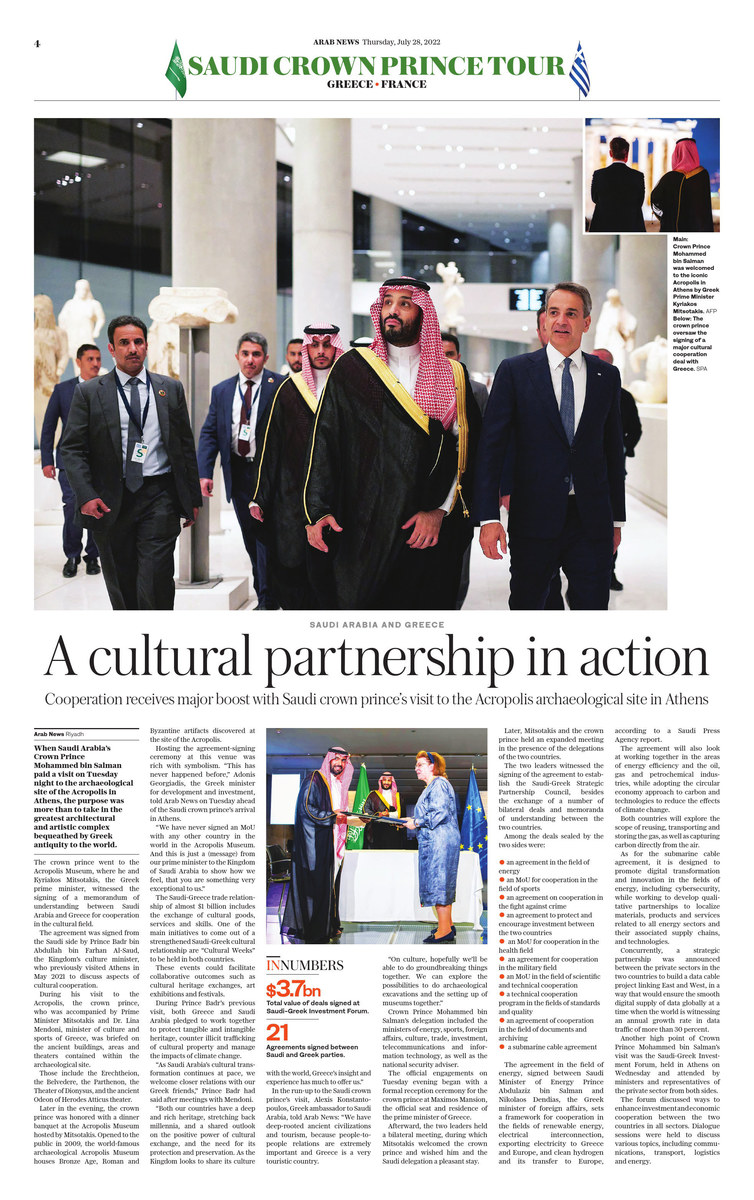RIYADH: When Saudi Arabia’s Crown Prince Mohammed bin Salman paid a visit on Tuesday night to the archaeological site of the Acropolis in Athens, the purpose was more than to take in the greatest architectural and artistic complex bequeathed by Greek antiquity to the world.
The crown prince went to the Acropolis Museum, where he and Kyriakos Mitsotakis, the Greek prime minister, witnessed the signing of a memorandum of understanding between Saudi Arabia and Greece for cooperation in the cultural field.
The agreement was signed from the Saudi side by Prince Badr bin Abdullah bin Farhan Al-Saud, the Kingdom’s culture minister, who previously visited Athens in May 2021 to discuss aspects of cultural cooperation.

The crown prince oversaw the signing of a major cultural cooperation deal with Greece. (SPA)
During his visit to the Acropolis, the crown prince, who was accompanied by Prime Minister Mitsotakis and Dr. Lina Mendoni, minister of culture and sports of Greece, was briefed on the ancient buildings, areas and theaters contained within the archaeological site.
Those include the Erechtheion, the Belvedere, the Parthenon, the Theater of Dionysus, and the ancient Odeon of Herodes Atticus theater.
Later in the evening, the crown prince was honored with a dinner banquet at the Acropolis Museum hosted by Mitsotakis. Opened to the public in 2009, the world-famous archaeological Acropolis Museum houses Bronze Age, Roman and Byzantine artifacts discovered at the site of the Acropolis.
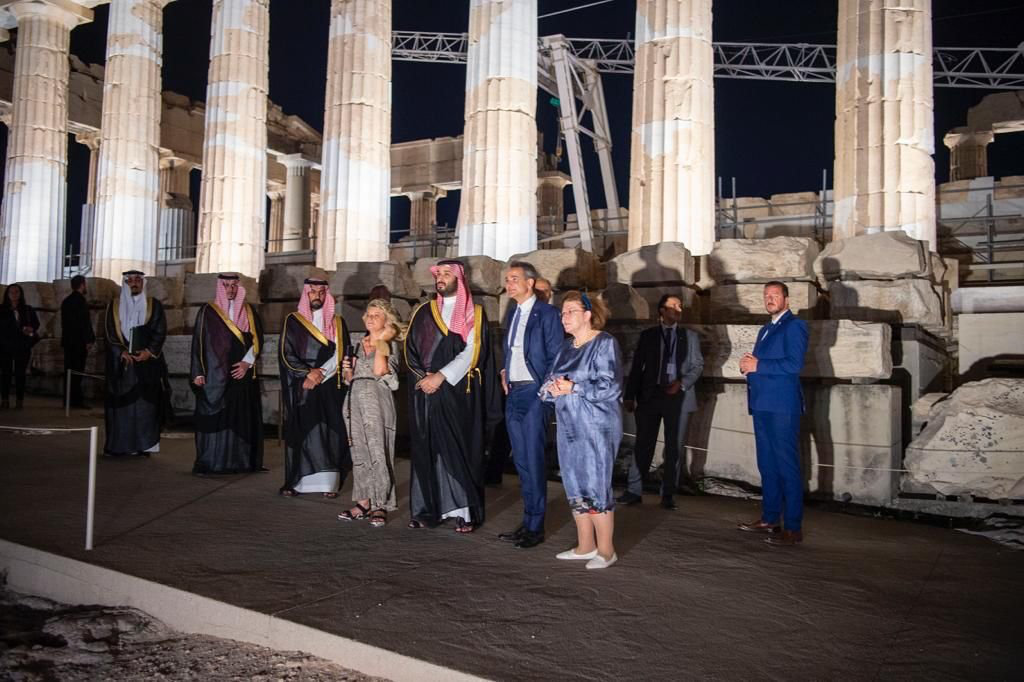
Crown Prince Mohammed bin Salman and his delegation are shown around the Acropolis by Greek Prime Minister Kyriakos Mitsotakis. (AFP)
Hosting the agreement-signing ceremony at this venue was rich in symbolism. “This has never happened before,” Adonis Georgiadis, the Greek minister for development and investment, told Arab News on Tuesday ahead of the Saudi crown prince’s arrival in Athens.
“We have never signed an MoU with any other country in the world in the Acropolis Museum. And this is just a (message) from our prime minister to the Kingdom of Saudi Arabia to show how we feel, that you are something very exceptional to us.”
FASTFACT
In September 2021, the Saudi-Greek Business Council was set up to enhance bilateral trade and investment.
The Saudi-Greece annual trade relationship of almost $1 billion includes the exchange of cultural goods, services and skills. One of the main initiatives to come out of a strengthened Saudi-Greek cultural relationship are “Cultural Weeks” to be held in both countries.
These events could facilitate collaborative outcomes such as cultural heritage exchanges, art exhibitions and festivals
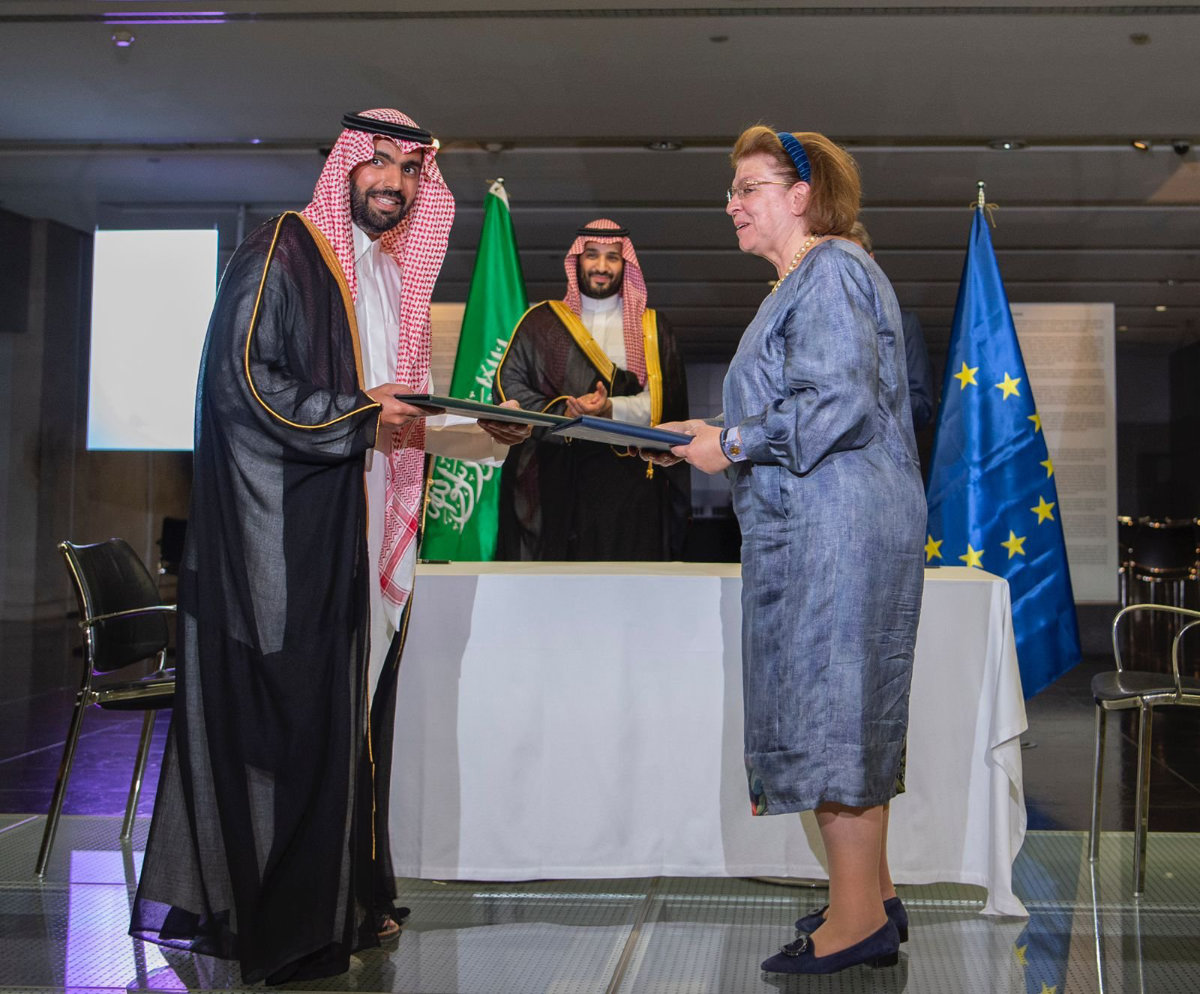
Prince Badr bin Abdullah bin Farhan Al-Saud, Saudi minister of culture, and Dr. Lina Mendoni, minister of culture and sports of Greece, signed a major cultural cooperation deal. (SPA)
During Prince Badr’s previous visit, both Greece and Saudi Arabia pledged to work together to protect tangible and intangible heritage, counter illicit trafficking of cultural property and manage the impacts of climate change.
“As Saudi Arabia’s cultural transformation continues at pace, we welcome closer relations with our Greek friends,” Prince Badr had said after meetings with Mendoni.
“Both our countries have a deep and rich heritage, stretching back millennia, and a shared outlook on the positive power of cultural exchange, and the need for its protection and preservation. As the Kingdom looks to share its culture with the world, Greece’s insight and experience has much to offer us.”
In the run-up to the Saudi crown prince’s visit, Alexis Konstantopoulos, Greek ambassador to Saudi Arabia, told Arab News: “We have deep-rooted ancient civilizations and tourism, because people-to-people relations are extremely important and Greece is a very touristic country.
“On culture, hopefully we’ll be able to do groundbreaking things together. We can explore the possibilities to do archaeological excavations and the setting up of museums together.”
Crown Prince Mohammed bin Salman’s delegation included the ministers of energy, sports, foreign affairs, culture, trade, investment, telecommunications and information technology, as well as the national security adviser.
The official engagements on Tuesday evening began with a formal reception ceremony for the crown prince at Maximos Mansion, the official seat and residence of the prime minister of Greece.
Afterward, the two leaders held a bilateral meeting, during which Mitsotakis welcomed the crown prince and wished him and the Saudi delegation a pleasant stay.
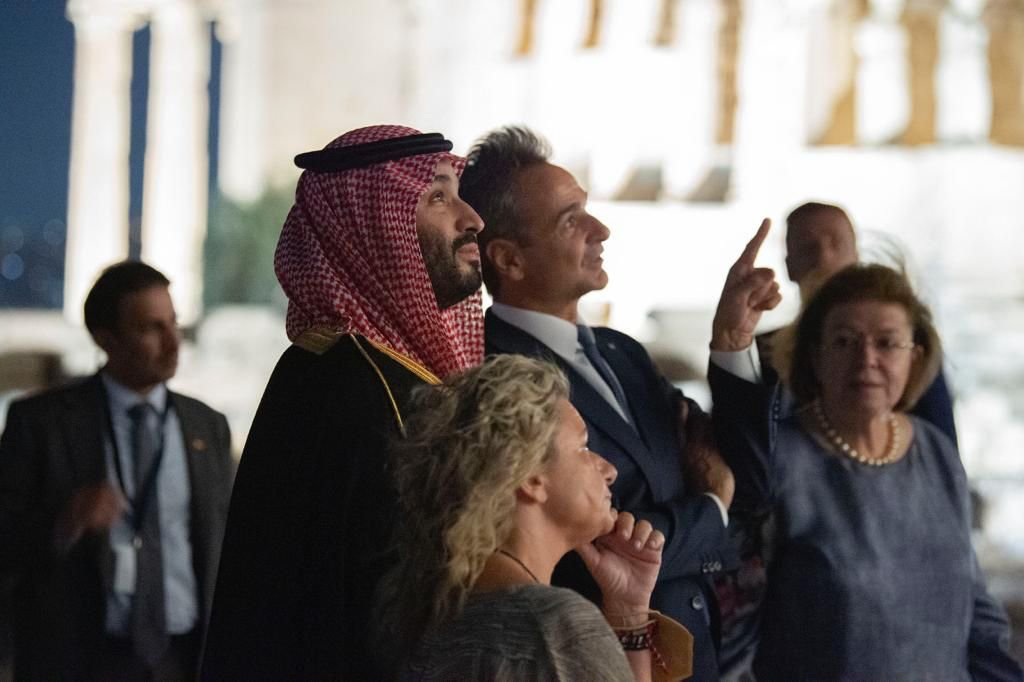
Greek Prime Minister Mitsotakis briefs the Saudi crown prince on the important features of the Acropolis. (SPA)
Later, Mitsotakis and the crown prince held an expanded meeting in the presence of the delegations of the two countries.
The two leaders witnessed the signing of the agreement to establish the Saudi-Greek Strategic Partnership Council, besides the exchange of a number of bilateral agreements and memoranda of understanding between the two countries.
The deals sealed by the two sides included:
- an agreement in the field of energy
- an MoU for cooperation in the field of sports
- an agreement on cooperation in the fight against crime
- an agreement to protect and encourage investment between the two countries
- an MoU for cooperation in the health field
- an agreement for cooperation in the military field
- an MoU in the field of scientific and technical cooperation
- a technical cooperation program in the fields of standards and quality
- an agreement of cooperation in the field of documents and archiving, and
- a submarine cable agreement.
The agreement in the field of energy, signed between Saudi Minister of Energy Prince Abdulaziz bin Salman and Nikolaos Dendias, the Greek minister of foreign affairs, sets a framework for cooperation in the fields of renewable energy, electrical interconnection, exporting electricity to Greece and Europe, and clean hydrogen and its transfer to Europe, according to a Saudi Press Agency report.
The agreement will also look at working together in the areas of energy efficiency and the oil, gas and petrochemical industries, while adopting the circular economy approach to carbon and technologies to reduce the effects of climate change.
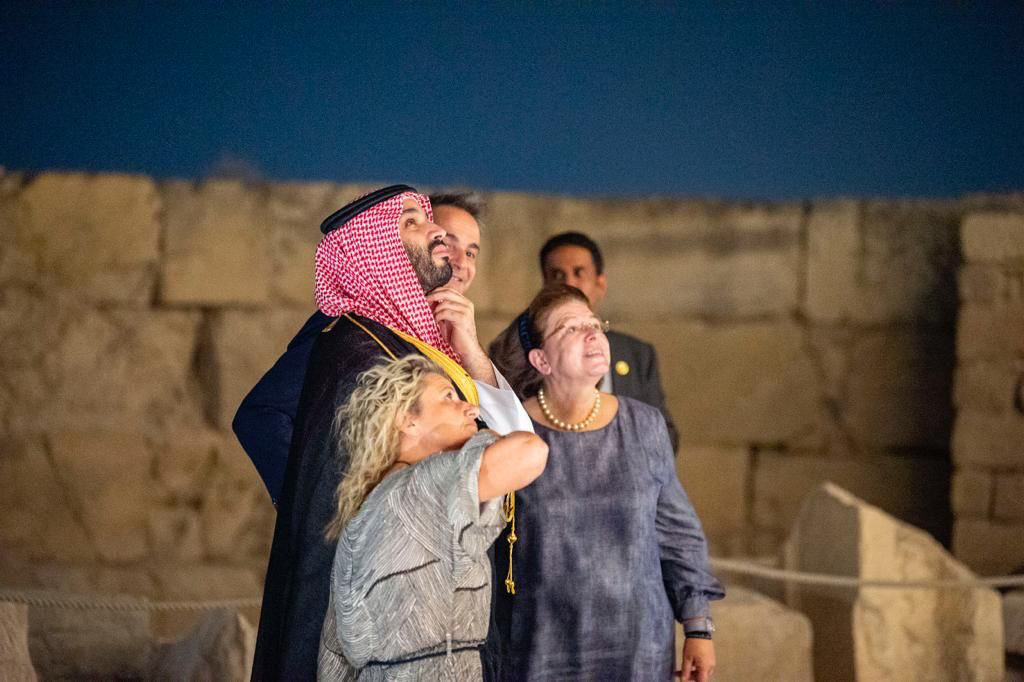
Saudi Crown Prince Mohammed bin Salman is shown around the Acropolis. (SPA)
Both countries will explore the scope of reusing, transporting and storing the gas, as well as capturing carbon directly from the air.
As for the submarine cable agreement, it is designed to promote digital transformation and innovation in the fields of energy, including cybersecurity, while working to develop qualitative partnerships to localize materials, products and services related to all energy sectors and their associated supply chains, and technologies.
Concurrently, a strategic partnership was announced between the private sectors in the two countries to build a data cable project linking East and West, in a way that would ensure the smooth digital supply of data globally at a time when the world is witnessing an annual growth rate in data traffic of more than 30 percent.
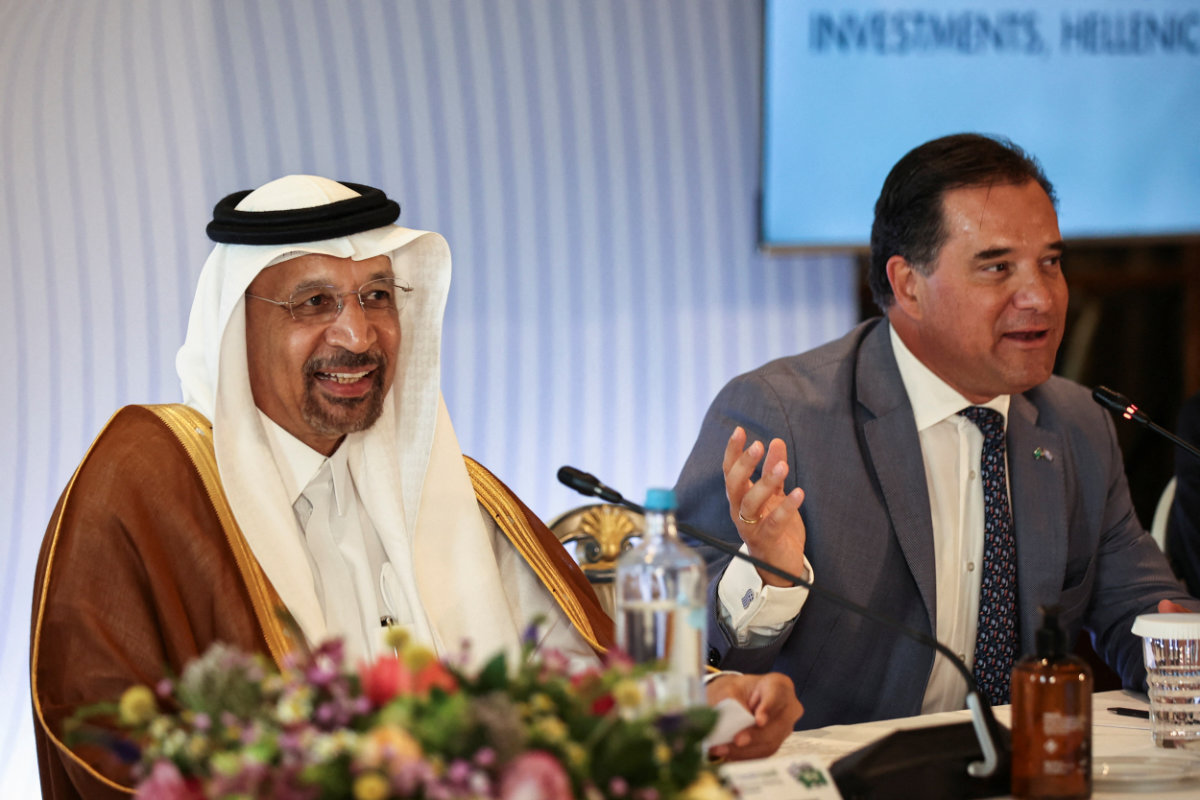
Saudi Minister of Investment Khalid Al-Falih and Greek Minister for Development and Investment Adonis Georgiadis attend a Greek-Saudi business meeting in Athens on July 27, 2022. (Reuters)
Another high point of Crown Prince Mohammed bin Salman’s visit was the Saudi-Greek Investment Forum, held in Athens on Wednesday and attended by ministers and representatives of the private sector from both sides.
The forum discussed ways to enhance investment and economic cooperation between the two countries in all sectors. Dialogue sessions were held to discuss various topics, including communications, transport, logistics and energy.
Khalid Al-Falih, the Saudi minister of Investment, attended a meeting of private sector representatives, alongside Minister of Communications and Information Technology Abdullah bin Amer Al-Swaha and Minister of Commerce and Acting Minister of Media Majid bin Abdullah Al-Qasabi.
The meeting culminated in the signing of 21 investment agreements in the fields of logistics, transportation, defense, renewable energies, manufacturing, environment services, aquaculture, import and export, engineering and agriculture.
Saudi and Greek government and private sector representatives discussed mutually beneficial investment opportunities, further bolstering commercial relationships.
